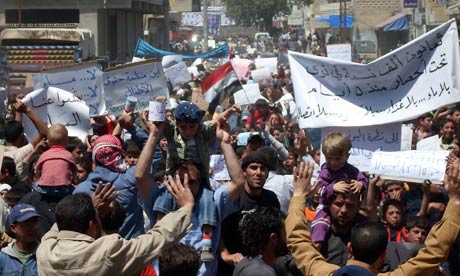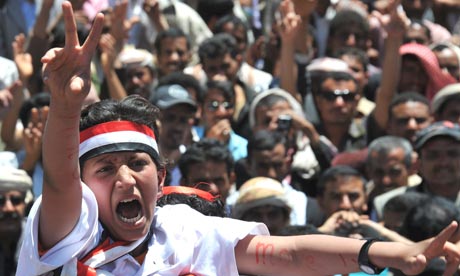The rich and powerful are indifferent to their fellow Syrians and have too much to lose to want the current regime to end
By Simona Sikimic
This commentary was published in The Guardian on 11/06/2011

By Simona Sikimic
This commentary was published in The Guardian on 11/06/2011

Syrian anti-government protesters calling for an end to a military siege in Nawa near the southern town of Daraa in April. Photograph: AFP/Getty Images
International pressure for President Bashar al-Assad to step down may be growing, but it has failed to catch on among many of the Syrian elite who are carrying on with their lives as usual – in a bubble.
The growing violence – said to have left 1,200 dead and several thousands imprisoned even after the announcement of a prisoner amnesty on 31 May – has not dented the newly moneyed upper middle class's obsession with pleasure and luxury.
Private raves, hosted in the mansions of the rich and powerful, continue unabated, even as EU and US sanctions begin to bite at some of the regime's top personalities.
Pool parties in the Damascus suburb of Barada are openly promoted on Facebook, inviting patrons to get "wet and wild" every Friday as mosques call the faithful to prayer. The day is always busy and organisers say ticket sales failed to take a dip last month when fighting edged closer and sniper fire could be heard between the rare intermissions of trance music beats.
The fuel behind the fun is not escapism, but indifference. A sense of affiliation with fellow man does not regularly permeate the upper stratosphere of this former Soviet ally.
Many of the young, fashionable crowd in Damascus and Aleppo – who have varying degrees of association with the regime – drive in fast cars with blacked-out windows and openly smoke marijuana, knowing they are above the law and resenting the ongoing troubles.
Demands for higher living standards for all and at least a semblance of democratic reform, mixed with an undeniable religious zeal shared by the majority of protesters, could not be further away from the aspirations of the ruling few.
The Syrian elite cannot contemplate deserting Assad, no matter how unsettled about events they personally may be. They have too much to lose and virtually nothing to gain and feel irrevocably alienated from their fellow countrymen.
To an extent, this can be attributed to the sectarian divide which has pinned the majority Sunni population against the Alawite and Christian minorities, traditionally seen as loyal supporters of the largely secular Ba'athist regime.
But the problem is equally a battle of the haves and the have-nots. Certainly, religion matters much less at the Barada pool than who is ordering champagne and who is drinking the local beer.
More than just greed or corruption, the problem stems from conflicting visions regarding the future and how to move Syria forward.
After years of trying to modernise the economy by phasing out subsidies on key goods such as petrol and sugar, the regime immediately reversed its policy on 16 January after popular protests pushed Tunisian president Zine al-Abidine Ben Ali from power.
According to Syrian finance minister Mohammad al-Hussein, the increase in the heating oil allowance alone will cost the state $326m (£200m) a year, benefiting two million public workers and retirees out of a population of 20m.
But populist measures such as this cannot endure if the elite's aspirations are to be fulfilled. In contrast to Egypt and Libya, where political resignations have become commonplace, no leading figures in Syria have publicly switched allegiances, even in the face of rising bloodshed.
For the business and political classes and their offspring, the price of dissent is high, but the fear of what would replace the status quo is even higher, and the Syrian people should not expect sympathies to turn or influential advocates to speak up on their behalf any time soon.
The Arab upheavals of the last six months have made the impossible look almost easy, but the wider the crevasse dividing the two sides, the harder the transition will be. So different are the various visions of the future vying for prominence in Syria that national reconciliation, no matter what reform promises may be made, is going to be very difficult
The growing violence – said to have left 1,200 dead and several thousands imprisoned even after the announcement of a prisoner amnesty on 31 May – has not dented the newly moneyed upper middle class's obsession with pleasure and luxury.
Private raves, hosted in the mansions of the rich and powerful, continue unabated, even as EU and US sanctions begin to bite at some of the regime's top personalities.
Pool parties in the Damascus suburb of Barada are openly promoted on Facebook, inviting patrons to get "wet and wild" every Friday as mosques call the faithful to prayer. The day is always busy and organisers say ticket sales failed to take a dip last month when fighting edged closer and sniper fire could be heard between the rare intermissions of trance music beats.
The fuel behind the fun is not escapism, but indifference. A sense of affiliation with fellow man does not regularly permeate the upper stratosphere of this former Soviet ally.
Many of the young, fashionable crowd in Damascus and Aleppo – who have varying degrees of association with the regime – drive in fast cars with blacked-out windows and openly smoke marijuana, knowing they are above the law and resenting the ongoing troubles.
Demands for higher living standards for all and at least a semblance of democratic reform, mixed with an undeniable religious zeal shared by the majority of protesters, could not be further away from the aspirations of the ruling few.
The Syrian elite cannot contemplate deserting Assad, no matter how unsettled about events they personally may be. They have too much to lose and virtually nothing to gain and feel irrevocably alienated from their fellow countrymen.
To an extent, this can be attributed to the sectarian divide which has pinned the majority Sunni population against the Alawite and Christian minorities, traditionally seen as loyal supporters of the largely secular Ba'athist regime.
But the problem is equally a battle of the haves and the have-nots. Certainly, religion matters much less at the Barada pool than who is ordering champagne and who is drinking the local beer.
More than just greed or corruption, the problem stems from conflicting visions regarding the future and how to move Syria forward.
After years of trying to modernise the economy by phasing out subsidies on key goods such as petrol and sugar, the regime immediately reversed its policy on 16 January after popular protests pushed Tunisian president Zine al-Abidine Ben Ali from power.
According to Syrian finance minister Mohammad al-Hussein, the increase in the heating oil allowance alone will cost the state $326m (£200m) a year, benefiting two million public workers and retirees out of a population of 20m.
But populist measures such as this cannot endure if the elite's aspirations are to be fulfilled. In contrast to Egypt and Libya, where political resignations have become commonplace, no leading figures in Syria have publicly switched allegiances, even in the face of rising bloodshed.
For the business and political classes and their offspring, the price of dissent is high, but the fear of what would replace the status quo is even higher, and the Syrian people should not expect sympathies to turn or influential advocates to speak up on their behalf any time soon.
The Arab upheavals of the last six months have made the impossible look almost easy, but the wider the crevasse dividing the two sides, the harder the transition will be. So different are the various visions of the future vying for prominence in Syria that national reconciliation, no matter what reform promises may be made, is going to be very difficult
